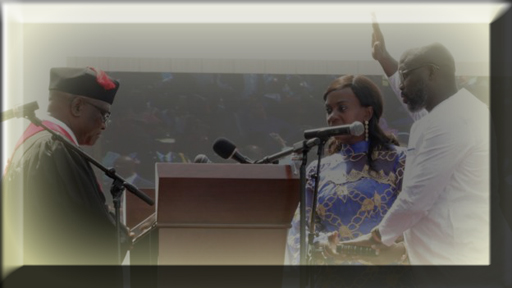President Weah’s Pro-People’s Policy Versus World Bank’s
By J. Yanqui Zaza
 |
|---|
| President George Manneh Weah |
Amongst the many recommendations forwarded to our President, Mr. George Manneh Weah, I have yet to see any proposal as to how best Liberia can generate the necessary revenue to finance the needed programs. Currently, Liberia’s reliance on users’ tax (i.e., such as import tax, which constitutes 50% of government revenue) is inadequate to fund the current budgetary allotment, not to mention additional programs.
However, an appropriate alternative for generating adequate revenue would require a World Bank’s approval since the World Bank (WB), Liberia’s economic adviser and creditor, generates a significant portion of its revenue from money lent to countries to replace LOST REVENUE. For example, the WB’s June 30, 2015, Audited Financial Statements show that the WB earned $1.1 trillion interest income from loans, but paid $392 million interest expense to borrow the same amount lent to financially cash-strapped countries. Predictably, cognizant of the profit motives of the WB, Botswana abandoned the WB’s policy and began to share in the management of its natural resources. Subsequently, revenue from diamond contributes about 50% to the country’s national budget. This is because Botswana adds values to its diamonds before export, reduces royalty fees and management fees paid to foreign parents, and demands a market price for its exports, not the low prices dictated by foreign parents.
The million dollar question is will President Weah follow Botswana’s path or accept the lopsided theory propagated by the WB and profiteers that government bureaucrats are more corrupt than chief executives, therefore, government should limit its activities and should allow profiteers to own and, or manage the resources and profits will trickle down to the masses. Undoubtedly, public records indicate that chief executives on Wall Street or in Silicon Valley are corrupt, and are responsible for the financial crisis such as the 2008 Wall Street Financial Meltdown. Additionally, International Transparency and, or the African Union Committee, headed by the former President of South Africa, Mr. Thabo Mbeki, relying on investigative Reports, stated that multinational corporations do not only initiate bribes offering but are responsible for ninety-five percent (95%) of the $60 billion that is siphoned out of Africa every year.
Let us review the records of June 30, 2015, Audited Financial Statements of the World Bank (WB), founded in 1934 to reduce poverty and ignorance, and determine whether it can accept and promote the pro-people's Policy of President George Manneh Weah.
- Big business (de facto owner) owns $293,304,000,000 of WB’s total assets of $343,225,000,000.
- The legal owners, 180 countries, own $38,637,000,000 as Total Equity; WB paid $150,000 per year for each of the 6000 special employees, according to Reem Heakai of (Inestopedia.com).
- Interest Income- $1,170,000,000. Interest Expense: $392,000,000 in 2015. Interest Income: $1,179,000,000, Interest Expense- $387,000,000 in 2014. Interest Income-$1,427,000,000, Interest Expense-$615,000,000 2013.
- WB owns and, or manages Non-governmental Agencies (NGOs). And half of WB’s lending projects had provisions for NGOs, according to the Director of Global Policy Forum, Mr. James A. Paul.
In addition to the figures of the audited Financial Statements, does the WB encourage countries to build gigantic projects (i.e., Hotel Africa in Liberia, Akosombo Dam in Ghana, Aswan in Egypt, etc.,) in order to lend loan?
Does the WB encourage poor countries to pay excessive allowances to advisers, thereby, creating the need to borrow money to replace the LOST REVENUE? In the case of Liberia, the payment of excessive allowances did not only create the need to borrow money, but it encouraged others officials to argument their salary. In fact, Liberian Lawmakers demanded and began to receive excessive compensations, an additional LOSS OF REVENUE.
Does the WB encourage Central Banks of poor countries to use “Special Drawing Rights (SDRs) (i.e., a privilege to borrow) to increase the Bank’s assets in order to persuade stakeholders that the Bank is financially strong to borrow money? In the case of Liberia, the Central Bank of Liberia did not only used SRSs but also included long-term accounts receivable as cash equivalents assets.
Does the WB, deceptively, encourage poor countries to become members of the World Trade Organization (WTO), in order to discourage poor countries from amending concessionary agreements. This is because the arbitration within the WTO is at most times where arbiters give a final judgment on issues, including concessionary agreements. In the case of Liberia, can President Weah convince members of the WTO that its local judges within Liberian Courts should remain the final arbiters?
Did the WB play any role in the design, discussion, and conclusion of the 62 fraudulent concessionary agreements that President Ellen Johnson Sirleaf government negotiated and signed? The London-based Certified Public Accounting Firm reported that 62 of the 68 concessionary agreements were fraudulent.
Does the WB discourage poor countries from becoming self-sufficient in food production in order to rely on importation, which must be subsidized by government’s revenue, thereby increasing the need to borrow money to replace the LOST REVENUE?
Does the WB support the idea that non-governmental agencies are less corrupt than government officials, primarily because the WB owns and manages NGOs?
Does the WB encourage local profit-making investors to own and, or manage lucrative assets such as Real Estate, Gold, Diamond, Timber, etc. in order to compel the country to use money borrowed to replace the LOST REVENUE that would have been generated if government bureaucrats had manage these lucrative assets?
The WB and its sisterly institutions are like any profit-making entity, which focuses on making profits rather than focusing on the plight of the poor. In fact, to increase profits, lending institutions or credit card companies will lure borrowers to undertake risky loans; including borrowing more money than the borrowers can afford to pay. This is because bankrupt borrowers or defunct institutions usually end up paying the higher cost of borrowing than borrowers that are solvent.
